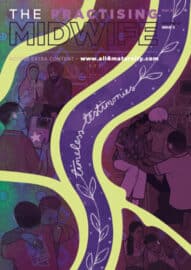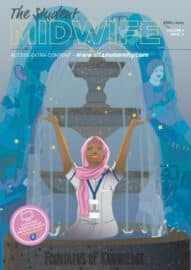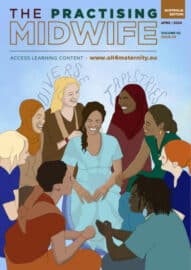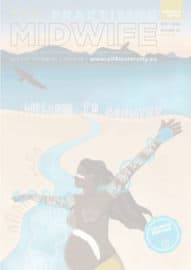Keep Calm, You Will be Okay: Coronavirus (COVID-19) while pregnant or giving birth
Professor Hannah Dahlen – Professor of Midwifery, Western Sydney University Australia
The original article written for the Conversation and published on 16th March 2020 had to be shortened and some of the information was not included. Here is a longer more comprehensive and updated international version.
Midwives and doctors around the world are dealing with an unprecedented Coronavirus health crisis, with new information coming out every day. While it is a confusing and stressful time for all of us, when it comes to pregnant women and their babies the news appears to be more positive.
 Coronavirus (COVID-19) has officially been upgraded by the World Health Organisation to a pandemic due to more than 114 countries now reporting infections. The epicentre (central point) has now moved from China to Europe and with this comes new insights into how to care for those affected. The increased risk for older people and those with health issues has received a lot of attention, but there is less information for women who are pregnant or giving birth.
Coronavirus (COVID-19) has officially been upgraded by the World Health Organisation to a pandemic due to more than 114 countries now reporting infections. The epicentre (central point) has now moved from China to Europe and with this comes new insights into how to care for those affected. The increased risk for older people and those with health issues has received a lot of attention, but there is less information for women who are pregnant or giving birth.
Having a baby is stressful enough without also having to process misinformation. As COVID-19 is a new virus we are learning more about it every day. As most pregnant women are young and healthy, they are a group less likely to be severely affected which is good news. As there is also a baby to consider, the picture can be more complex. A baby born recently to a mother in the UK with COVID-19 has recently tested positive soon after birth but we are not sure whether it was infected in the womb (unlikely) or after birth (more likely). As far as we know the baby is fine and the mother is being treated. Other reports on babies with COVID-19 have also shown they had mild symptoms and a good recovery. The same is true for pregnant women.
From China’s experience to WHO advice
To date much of our information on COVID-19 has come from China. This is where one of the first studies, involving just 9 pregnant women with COVID-19 came from. All these women had caesarean sections, none were seriously unwell and all mothers and babies recovered. The study found none of the babies appeared to get COVID-19 and there was no evidence of the virus in the baby, breastmilk or fluid surrounding the baby. China has a very high caesarean section rate, which is not optimal, and this may have influenced how they responded. There is no information from these cases as to why caesarean section was performed.
An even more recent study, again from China, of 41 pregnant women compared to 14 non-pregnant adults found that pregnant women were atypical in their presentation. All the women had mild illness, none were admitted to ICU and there was no evidence off mother to baby transmission. Interestingly pregnant women were more likely to have a initially normal temperature (so may not be a useful screening tool) and they had higher white blood cells and neutrophils (sign of inflammation). This indicates the amazing pregnant woman’s body is doing just the right thing when it comes to responding to COVID-19. A high temperature can be problematic to the unborn baby while a good immune response to the virus means the body deals with it more efficiently.
The World Health Organisation has just released new guidelines and state:
there is no evidence that pregnant women present with different signs or symptoms or are at higher risk of severe illness. So far, there is no evidence on mother-to-child transmission when infection manifests in the third trimester … WHO recommends that caesarean section should ideally be undertaken only when medically justified

Why pregnant women are NOT more susceptible to COVID-19
Pregnant women are generally more susceptible to viruses that cause breathing problems (like the flu) due to having a lowered immunity during pregnancy and changes to their physiology (lungs more compressed, need more oxygen). However, this does NOT seem the case with COVID-19. In an analysis of 147 women with COVID-19 only 8% had severe disease and 1% were in critical condition, which is lower than the general population.
It might actually be that the lowered immune response of pregnancy, which is needed to stop a woman’s body responding to her baby as a health threat, is actually protective with COVID-19. COVID-19 seems to be more severe in people with an immune system working hard dealing with other health disorders.
This is not the case with other similar respiratory viruses. In the 1918 Spanish Flu pandemic the death rate was 2.6% in the general population and 37% in pregnant women. Pregnant women were at greater risk during the 2009 H1N1 pandemic (4 times more likely to be admitted to hospital) and with SARS (33% needed mechanical ventilation).
With COVID-19 we find more men than women affected and women are less likely to get severely ill and to die (to date the death rate is 1.7% for women and 2.8% for men). However, as the pandemic spreads this may change due to the fact women comprise the majority of the health workforce and caregivers so will be in contact with more sick people. In 2020, the International Year of the Nurse and Midwife, our nurses and midwives are showing just why they are so incredible and awarded such an honour.
How can pregnant women protect themselves and others?
Pregnant women should do the same things as the general public to protect themselves, such as covering their mouth when coughing (cough into your elbow or arm), avoid people who are sick, ask people who are not well to avoid visiting them, wash hands often with soap and water or an alcohol-based sanitizer and avoid large gatherings. It would be sensible not to travel overseas at the moment as you may also not be allowed back in the country and will now have self-isolate when you return.
In Australia and some other countries women who think they may have contracted COVID-19 are now able to consult their GP or other health professional with a bulk billed telehealth call (free video call consultation) rather than having to go in person. Women who are pregnant or have new babies have been prioritised in many countries to gain access to telehealth and other specialist services.
If you have been asked to self-isolate due to contact with someone with COVID-19, or have the illness, make sure you contact your midwife or obstetrician by phone and follow the advice of your health care provider.
What about going into a hospital for antenatal care and birth?
Birth will proceed as planned in the vast majority of cases and going home early would be ideal and may be encouraged if you and your baby are well.
Antenatal appointment arrangements will differ depending on your particular circumstance, and your model of care. If you and your baby are well then missing one or two appointments won’t matter if this is necessary.
If you are planning to have a homebirth or are in a continuity of midwifery care model where your midwife does your antenatal care in your own home then you are probably at the greatest advantage. NICE recommends women who are well should consider homebirth as an option and today with the COVID-19 pandemic this seems an even more sensible strategy. However, many women who are already well established in their model of care and in their second or third trimester may not be able to get a place in a homebirth program or indeed find a homebirth midwife to attend them. Worryingly in Australia we are starting to see online discussions where women are considering freebirth (no midwife in attendance). This is far from ideal and we always recommend that you have registered health provider at your birth.
If you are well then you would continue with your plans whatever they are. In some countries more community-based antenatal care is being set up to avoid hospitals where possible. If you are booked into a birth centre or hospital lots of precautions are in place to minimise the risk of infection. Birth will proceed as planned in the vast majority of cases and going home early would be ideal and may be encouraged if you and your baby are well. Be aware some hospitals are restricting visitors and even support people, other than the partner, to try and reduce risk to the community. Again we are in extraordinary times so we all need to be patient, kind and tolerant.
Can the baby be infected with COVID-19 in the uterus?

The placenta is a very efficient filtering system and does an amazing job protecting babies from harm. The Zika virus was an exception to this. There is no evidence of increased complications, though if a woman was very unwell (high temperature, pneumonia) then the baby may be born early (preterm). This may be due to deliberate intervention on the part of health professionals if the woman is very sick. In general, a COVID-19 diagnosis should not lead to a decision for an early birth, unless ending the pregnancy is thought to be beneficial to the mother due to her overall condition. There is not enough evidence that COVID-19 increases miscarriage and it is too early to know other longer-term impacts on the baby.
What should I do after the birth?
The benefits of breastfeeding are so significant the WHO recommends this should be encouraged and initiated within 1 hour of birth. Likewise skin-to-skin contact should be supported immediately following birth if the baby is well. If the mother is too ill, then she should be assisted to express her milk. This is because the protective effect of breastfeeding is particularly strong against infectious diseases through directly transferring antibodies and other important immune factors to the baby. If the woman or the baby have an infection nature has a brilliant strategy of changing the composition of breastmilk to increase important components that help the baby fight infection. So, if you were thinking of giving up breastfeeding perhaps continue until this pandemic ends.
The WHO states: “Mothers and infants should be enabled to remain together and practice skin-to-skin contact, kangaroo mother care and to remain together and to practice rooming-in throughout the day and night, especially immediately after birth during establishment of breastfeeding, whether they or their infants have suspected, probable, or confirmed COVID-19.”
WHO recommends that If women have COVID-19 they should wash their hands before and after contact with the baby, use a medical mask when near the baby if they have symptoms (such as coughing), and routinely clean and disinfect surfaces they may have touched.
What else can you do?
When the seasonal flu vaccine becomes available get vaccinated as we know this can be protective during pregnancy. It is free for pregnant women as they are considered an ‘at risk group’ and there are no risks to your baby from flu vaccine. You will not be protected from COVID-19 but you will get some protection from the flu which can be very problematic for pregnant women. The last thing you want is to have the flu and COVID-19 at the same time.
Most of all, try and stay calm and talk to your midwife or doctor if you are getting very worried.
Trusted sources of information
Royal College of Gynaecologists and Obstetricians
Thank you to all our amazing Nurses and Midwives
Remember 2020 is the year of the Nurse and Midwife. These health professionals can’t practice social distancing or isolation. They get up each day and put on a quiet display of their skills, dedication and bravery. They come home worried about what they bring to their loved ones, showering immediately, washing their uniforms separately, facing away from their partners, hugging the edge of the bed and wondering if they will be the one who brings the virus home. This is their first thought, before the thought that occupies everyone else, which is, “will I be okay?” So, next time you think 2020 has been shit so far, and it has, imagine being given a year of recognition for the first time in history and finding it was the year you risked your life more than ever before for others. #thankanurseormidwifein2020?







